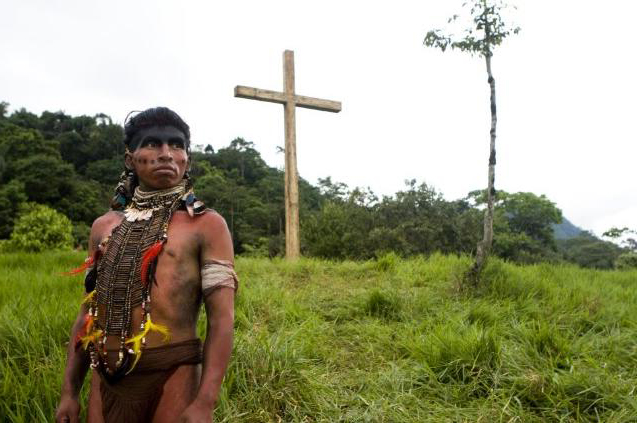Showing @ Filmhouse, Edinburgh until Sun 27 May
Icíar Bollaín / Spain/Mexico/France / 2010 / 103min
In the past two years, social media and advanced communications technology has had an unprecedented impact on petitions, protests, riots and revolts. But has the involvement of the Internet, Twitter and Facebook in such events affected our perception of those who rebel? In non-Western countries, the Internet has been integral to mobilisation, but in the UK, is it a way for us to avoid actually engaging in action? Paul Laverty – renowned collaborator of Ken Loach – has scripted a film that resounds loudly with revolutionary events of the last twelve months and questions our ability to fully understand how capitalism can, has and probably will again, infringe on human rights.
The film is set twelve years ago, in Bolivia, when the Government sold the water supply to a British/American multinational company provoking violent riots in the city of Cochabamba. When a group of filmmakers arrive in Bolivia to shoot a drama about Christopher Columbus and the Spanish conquest of the Americas, they cast a local man, Daniel (Juan Carlos Aduviri) in a significant role. When they discover his involvement with the protests against water privatisation, producer Costa (Luis Tosar) must do everything – and pay anything – to finish the film on schedule.
The effects of colonialism and capitalism are very plainly put, and director Icíar Bollaín doesn’t argue with the script: colonialism was bad 500 years ago, capitalism is equally as damaging to non-Western countries now. Instead, Laverty’s script asks more questions about our role as viewers or helpers or campaigners: artists like the filmmakers here believe their purpose is to document and expose the truth through their art, but what kind of immediate help is this giving? The recent Kony 2012 campaign raised a great deal of awareness through YouTube and Facebook, but what it has proactively achieved is limited.
The film draws us in very gently through the perspective of Sebastian (Gael García Bernal) and his cast and crew. While they are forced to experience the brutality and violence of the protests, it takes some amount of time before they fully comprehend what privatised water systems would mean for the local community. At the same time, they are desperate to prove the harmful effects of colonialism through the medium of film.
How we respond to oppressive governments depends firstly on how directly our lives are affected, and secondly on channels available. Western culture is adopting a dependency on social networks that are arguably ineffective: we indulge in “clicktivism”, but do we know what we’re signing for/against? We can be passive, and in the case of the riots last year, people who took action were deemed nothing more than criminals and their cause was never fully explored in the media; and so the systems that oppressed them enough to strike out went scot-free. While violence is not necessarily the answer, it will undoubtedly attract media and political attention. Laverty’s script is dense, intelligent and compelling. It states clearly: people don’t just wake up one day and decide to take action. They are forced to when decisions are made that restrict their access to basic human provisions and rights. It happened 500 years ago, twelve years ago and it’s happening again now.


Comments